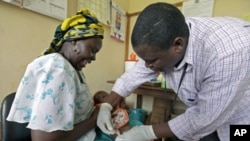The World Bank and International Finance Corporation have launched a report aimed at improving access to health care in Africa.
Africa’s public and private health providers do not work well together, according to the report, which was released Monday. Entitled "Healthy Partnerships," it investigates ways in which both sides of Africa’s health care system can engage each other in order to improve health care quality and access.
Throughout Africa, the provision of health care is limited by population growth, poor infrastructure, and lack of sufficient funding, among other obstacles. The continent bears over one quarter of the "global disease burden" - a United Nations measure of mortality due to disease.
Given the scope of the challenge, says World Bank East and Southern Africa Director Jean Philippe Prosper, governments must engage with the private sector to meet the need.
“Government and the private sector must work hand in hand to carry the heavy load that African health systems are asked to support," said Prosper. "All too often we find that many players, they can fail to achieve their reform objectives unless they sit together, plan together and share a common objective and strategy.”
According to the report, many of the problems lie with inefficiencies and a lack of oversight within African governments. In 39 of the 45 countries studied, a policy of private sector engagement exists, but only 12 have implemented those policies. The study also found that only six of the countries maintain a complete registry of health facilities and only five carry out inspections of private facilities.
But the report’s author, Connor Spreng, said the problem runs both ways.
“What we found is that the private sector is not organized enough and in many countries that is a constraint," said Spreng. "In only 19 of the 45 countries is the private sector well organized. But the government - if it is to initiate engagement - needs a credible, capable and representative partner to engage with.”
According to Spreng, "Healthy Partnerships" was written to encourage reform programs that would foster public-private partnerships in health care. Among the suggestions, the report urges governments to avoid burdensome interventions on the private health sector, to simplify regulations and to open dialogue so private sector activities are better understood. It also urges the private sector to form networks to facilitate simpler and more direct engagement with government.
Healthy Partnerships is part of the World Bank "Health in Africa" initiative, which seeks to utilize Africa’s private sector to pursue the U.N.'s millennium development goals and address the continent’s health challenges.
In attendance at the launch of the report in Nairobi was Kenyan Health Minister Anyang’ Nyong’o. Nyong’o said he hoped the report would encourage more partnerships and dispel the notion that more money was needed to provide better care.
Study: Public-Private Partnership Is Key to Africa's Health Care




